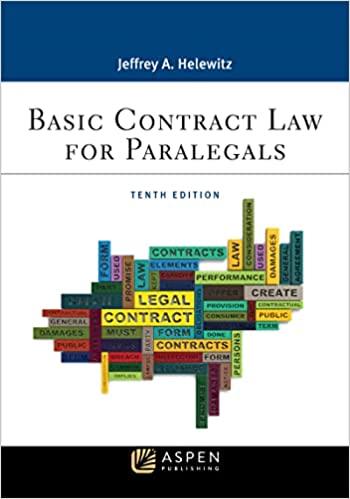Question
Please offer a well reasoned and articulate discussion on cases which includes the rationale for the decision in same along with the ramifications thereof for
Please offer a well reasoned and articulate discussion on cases which includes the rationale for the decision in same along with the ramifications thereof for business and society.
Courts and Alternative
Case 3.1: Gucci America, Inc. v. Wang Huoqing
Gucci America, Inc., a New York corporation, makes footwear, belts, sunglasses, handbags, and wallets. Gucci uses twenty-one trademarks associated with its goods. Wang Huoqing, a resident of the People's Republic of China, offered for sale through his Web sites counterfeit Gucci goods. Gucci hired a private investigator in California to buy goods from the sites. Gucci then filed a suit against Huoqing in a federal district court, seeking damages and an injunction preventing further trademark infringement. The court first had to determine whether it had jurisdiction.
The court held that it had personal jurisdiction over Wang Huoqing. The U.S. Constitution's due process clause allows a federal court to exercise jurisdiction over a defendant who has had sufficient minimum contacts with the court's forum. Huoqing's fully interactive Web sites met this standard. Gucci also showed that within the forum Huoqing had made at least one saleto Gucci's investigator. The court granted Gucci an injunction.
Case 3.2: Brothers v. Winstead
Phillips Brothers, LP, Harry Simmons, and Ray Winstead were the three members of Kilby Brake Fisheries, LLC, a Mississippi catfish farm. Winstead operated a hatchery for the firm, but with only two profitable years during his eight-year tenure, he was fired. He filed a suit in a Mississippi state court against Kilby Brake and its other members, alleging a corporate freeze-out. The defendants filed a counterclaim of theft. From an award to Winstead of more than $1.7 million, the defendants appealed.
The Mississippi Supreme Court reversed, and remanded the case holding that Kilby Brake was entitled to discovery regarding Winstead's outside incomethe trial court's refusal to allow discovery precluded the jury from finding out what happened to a certain load of fish, and this issue was central to both sides' theories of the case.
Case 3.3: Cruse v. Kroger Co.
Stephanie Cruise applied for a job with Kroger Co.'s Compton Creamery & Deli Kitchen. The application contained a clause requiring arbitration of "employment-related disputes." Cruise was hired. Four years later, she was fired. Cruise filed a suit in a California state court against Kroger, alleging employment discriminationretaliation, sexual harassment, sexual and racial discrimination, and failure to investigate and prevent harassment and retaliationas well as wrongful termination in violation of public policy, intentional infliction of emotional distress, and defamation. Kroger filed a motion to compel arbitration. The court held that there was no proof of a written agreement to arbitrate and denied the motion. Cruse appealed.
A state intermediate appellate court reversed. The appellate court concluded that the arbitration clause in the employment application established the parties agreed to arbitrate their "employment-related disputes" and that Cruise's claims fell within the meaning of the agreement.
Step by Step Solution
There are 3 Steps involved in it
Step: 1

Get Instant Access to Expert-Tailored Solutions
See step-by-step solutions with expert insights and AI powered tools for academic success
Step: 2

Step: 3

Ace Your Homework with AI
Get the answers you need in no time with our AI-driven, step-by-step assistance
Get Started


